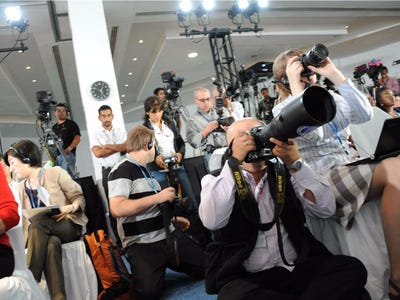If you needed extra proof of the deliquescence of mainstream media. According to a new study, journalists exhibit below-average ability to regulate their emotions, suppress biases, solve complex problems, switch between tasks, and show creative and flexible thinking.
The paper attribute these poor scores to excessive consumption of caffeine and alcohol, but I'm wondering if something more fundamental at work.
Journalists drink too much, are bad at managing emotions, and operate at a lower level than average, according to a new study
The paper attribute these poor scores to excessive consumption of caffeine and alcohol, but I'm wondering if something more fundamental at work.
Journalists drink too much, are bad at managing emotions, and operate at a lower level than average, according to a new study
Journalists drink too much, are bad at managing emotions, and operate at a lower level than average, according to a new study
May 19, 2017, 1:12 PM

Journalists also are apparently good at managing the stresses that come with their jobs. UNClimateChange / Flickr
Journalists' brains show a lower-than-average level of executive functioning, according to a new study, which means they have a below-average ability to regulate their emotions, suppress biases, solve complex problems, switch between tasks, and show creative and flexible thinking.
The study, led by Tara Swart, a neuroscientist and leadership coach, analysed 40 journalists from newspapers, magazines, broadcast, and online platforms over seven months. The participants took part in tests related to their lifestyle, health, and behaviour.
It was launched in association with the London Press Club, and the objective was to determine how journalists can thrive under stress. It is not yet peer reviewed, and the sample size is small, so the results should not be taken necessarily as fact.
Each subject completed a blood test, wore a heart-rate monitor for three days, kept a food and drink diary for a week, and completed a brain profile questionnaire.
The results showed that journalists' brains were operating at a lower level than the average population, particularly because of dehydration and the tendency of journalists to self-medicate with alcohol, caffeine, and high-sugar foods.
Forty-one percent of the subjects said they drank 18 or more units of alcohol a week, which is four units above the recommended weekly allowance. Less than 5% drank the recommended amount of water.
However, in interviews conducted in conjunction with the brain profile results, the participants indicated they felt their jobs had a lot of meaning and purpose, and they showed high mental resilience. Swart suggested this gave them an advantage over people in other professions in dealing with the work pressure of tight deadlines.
Journalists scored pretty high on:
Journalists scored lower on:
- Abstraction, the ability to deal with ideas rather than events. It's related to the part of the brain where the most sophisticated problem-solving takes place. In other words, it highlights the ability to think outside the box and make connections where others might not see them.
- Value tagging, the ability to assign values to different sensory cues, such as whether something is a priority or has meaning. Scoring highly in this area indicates a good ability to sift through information and pick out what's important.
Compared with bankers, traders, or salespeople, journalists showed that they were more able to cope with pressure. Traits that make journalism a stressful profession are deadlines, accountability to the public, unpredictable and heavy workloads, public scrutiny, repercussions on social media, and lower pay.
- Executive function. As well as the traits mentioned above, low scores for executive function also suggest poor sleep, nutrition, exercise, and mindfulness. Many participants reported they had no time for breaks while working.
- Silencing the mind, which is related to the ability to have thoughts without getting distracted by them, or a powerful ability to focus. Low scores indicate the opposite, suggesting journalists have a hard time preventing themselves from worrying about the future or regretting the past.
The results, however, showed that the journalists were on average no more physically stressed than the average person. The blood tests showed that their levels of cortisol — known as the stress hormone — were mostly normal.
"The headline conclusion reached is that journalists are undoubtedly subject to a range of pressures at work and home, but the meaning and purpose they attribute to their work contributes to helping them remain mentally resilient despite this," the study says. "Nevertheless, there are areas for improvement, including drinking more water and reducing alcohol and caffeine consumption to increase executive functioning and improve recovery during sleep."
Last edited by a moderator:


